They're Single. They're Straight. They're Friends. And They're Having a Baby.
You want a child. You don’t want to do it alone. What do you do? For an increasing number of women, the answer is raising a kid with their BFF.


Sarah and Kae’s first child arrived on their doorstep in southern Ontario at just four days old. Registered as foster parents, the pair received a call informing them that a baby needed a home. Did they want her or not? Days later, a social worker arrived with the infant and a brown paper bag full of essentials like diapers and formula. And then, after giving a confidence-boosting smile, she walked out the door. Sarah and Kae turned their attention to the baby girl suddenly lying in the middle of their carpet.
Sarah and Kae aren’t a couple. They’re best friends who decided to co-parent their children in a shared home. Both in their early 30s, Sarah and Kae met as first-year college roommates 15 years ago and have lived together ever since. They traveled Europe and adopted a dog together. Kae, whose parents live overseas, considers herself an unofficial sibling in Sarah’s big, welcoming family. When the two women are together, giggles punctuate their speech, and it’s easy to picture them gossiping through the night in a shared dorm room.
A few years ago, Sarah and Kae, who are both straight, felt called by their Christian faith to help others and wondered, why not welcome children into their home? Sarah had been running a daycare, Kae works in the health-care industry, and things with the dog were going well, so they felt confident they could handle foster parenting. While fostering their first child, now a toddler, they found out that her infant half sibling was also in need of a home, so they took him in as well. Soon, the two friends couldn’t imagine life without the children. Sarah and Kae filed for adoption and, in late 2018, won a landmark ruling in a Canadian court that gave them equal rights as platonic partners to adopt the two children. “And that’s how we became a family,” Sarah says.
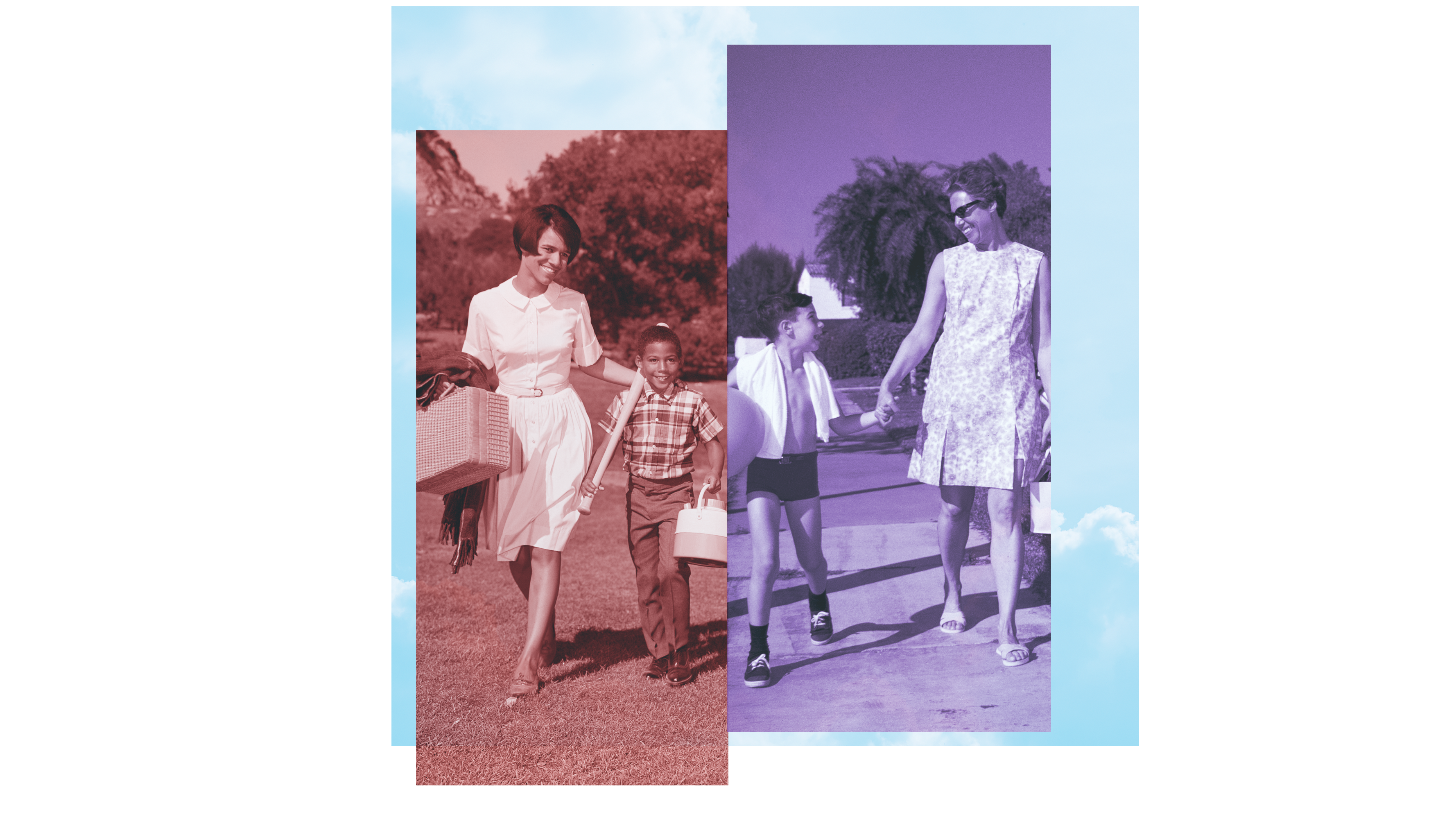
While many women have long given up the fantasy of “having it all,” plenty of others still want a family and don’t particularly want to do it alone. And if you’re ready to welcome a baby but swiping on dating apps is getting you nowhere, there just aren’t a lot of great choices. That’s why an increasing number of women are expanding their options by forming families with friends and sisters to raise children as co-parents and create what looks like conventional family life—a nuclear-like unit headed by two women in a platonic relationship who share responsibilities, dole out advice, pick up the slack, keep each other sane, and don’t need to be nagged into doing 50 percent of the child-rearing and household chores.
This kind of arrangement has the potential to flourish as marriage rates have declined across the U.S. Forty-two percent of adult Americans now live without a spouse or partner; for adults under 35, that number rises to 61 percent. For decades, the narrative associated with nonpartnered women who wanted to have a baby was “single parents by choice.” According to 2017 data from the Pew Research Center, 21 percent of children in the United States, or one in five, now live with a solo mother, up from 12 percent in 1968. The Pew report also found that 65 percent of American children live with two married parents, down from 85 percent in 1968.
There’s a pervasive myth that women who delay childbirth are careerists more interested in climbing the corporate ladder than swaddling a crying infant. But according to a 2018 study from De Montfort University in the U.K., the primary reason women freeze their eggs is to avoid “panic parenting” because they haven’t yet found the right partner. As we’re flooded by an expanding glossary of modern dating indignities—like ghosting (when someone you’re dating suddenly disappears), benching (when you’re someone’s backup choice), and stashing (when you’re in a relationship but your partner refuses to introduce you to his or her friends)—perhaps it should come as no surprise that women are looking for alternatives when it comes to creating a family.
These women are finding fulfillment through a pact that feels both revolutionary and like a total no-brainer.
Co-mom relationships might be platonic, but they are unmistakably love stories. For some, the arrangement is a matter of circumstance, while others come to co-parenting quite deliberately. Regardless, all of these women have decided to draw an expanded boundary around the idea of family, and they’re finding fulfillment through a pact that feels both revolutionary and like a total no-brainer.
Get exclusive access to fashion and beauty trends, hot-off-the-press celebrity news, and more.
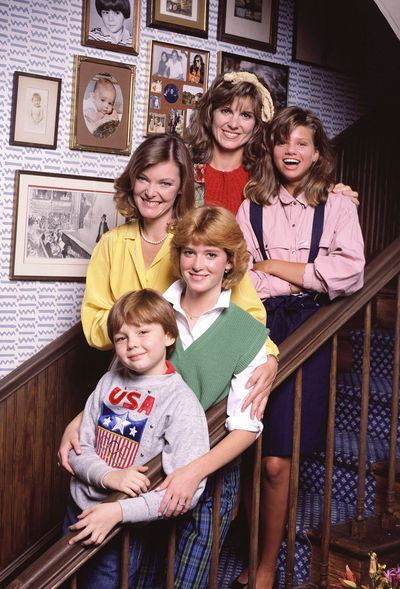
The cast of the CBS television sitcom ’Kate & Allie,’ in 1986.
Women banding together to raise children is neither new nor rare—see kibbutz life and TV’s circa-mid-1980s Kate & Allie—but formal co-parenting arrangements, which are less common, have been increasingly visible in the zeitgeist of late. Playing House, the USA Network sitcom that ran for three seasons until 2017, portrays two best friends who move in together after one gets pregnant so they can raise the baby together. CoAbode, a nationwide housing matching network, was launched in 2006 to bring together single mothers looking to split expenses and child-rearing duties. It formerly ran a Facebook page that was full of requests from women—from Seattle to Pittsburgh—looking for someone to lean on. Now, after registering, users can search by zip code to find moms in their area.
Ashley Simpo, a 35-year-old writer, was looking for that kind of support when she moved in with a good friend in New York City. They were both single mothers going through breakups. “It was about having a go-to backup and the same coordination you would have with a spouse,” says Simpo, who has a 7-year-old son. She liked sharing expenses—from almond milk to Netflix—and that her son built a sibling-like relationship with her friend’s two boys. The union lasted only eight months, but Simpo says she would do it again. “We need more options for women to rely on women,” she says. “Being stuck in a box, where you feel like you need to do it alone, is killing us.”
The oft-touted 1950s nuclear model of one doting father, one devoted mother, and 2.5 perfectly behaved children is more punitively aspirational than realistic. Family life has always been a hodgepodge of circumstances, and over the last several decades we’ve seen gradual acceptance of the idea that a family is really no more than a group of people who take care of one another—whether it’s LGBTQ couples, custody-splitting divorced spouses,
or longtime friends. “It’s a mistake to assume the nuclear-family model that emerged as the most common type of household in the postwar period is really part of a long tradition,” says Nicole Sussner Rodgers, founder and executive director of Family Story, a Washington, D.C.–based organization that advocates for all types of families. “The institution of marriage as the central organizing relationship of many adult lives has declined dramatically, and that’s creating some new and different ways of doing family. And there’s no reason to believe that a child being raised by a married romantic couple is better than any other kind of configuration.” In fact, a 2002 University of Chicago study found that outcomes (including likelihood of substance abuse and college graduation) were as good or better for children raised by single mothers in multigenerational environments with at least one grandparent as for those being raised by married parents.
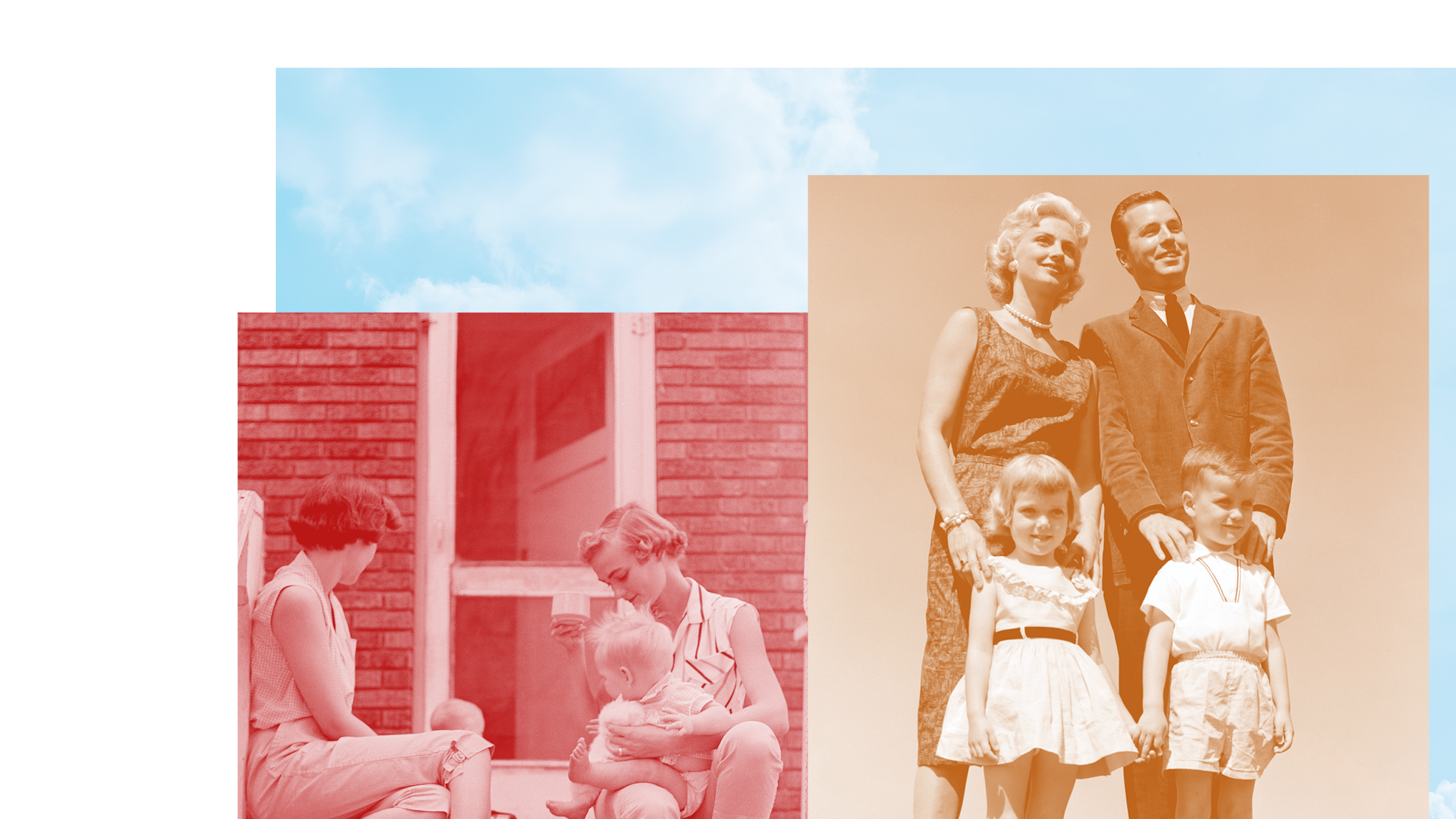
Statistics about platonic co-parenting are scarce, but 2017 research commissioned by Family Story found that 58 percent of unmarried mothers would consider raising a child with someone who is not a romantic partner. Interest in platonic options is growing, and there is now an increasing number of social networks for singles looking for co-parenting arrangements, including familybydesign.com and co-parentmatch.com. Some sites, like modamily.com, offer a matchmaking function for prospective co-parents. One 2015 study from the Centre for Family Research at the University of Cambridge found that the average age of seeking out a co-parenting arrangement is 33 for women and 38 for men.
Esther Perel, a psychotherapist practicing in New York City and the host of the popular couples-therapy podcast Where Should We Begin?, told Marie Claire she predicts, in the next 25 years, a “rise of friendship parenting” between adults who want to co-parent without being in a singular committed relationship. “We often think of relationships between two people, but in the future, I’d like to see more consideration of relationships between communities, groups, and countries,” she adds.
“Sometimes I wonder what things would be like if I was doing this with a husband, but then I look at my friends who are married and I know it’s not perfect over there either,” says Lauren Brim, a 36-year-old sex coach in Los Angeles who wrote about her experience raising a now-4-year-old child with a straight male friend in her 2016 book, The New American Family: Modern Stories of Family Formation in the Twenty-First Century. “You can wander the earth looking for Mr. Right for a long time and not find him.” Brim says she was inspired, in part, by a recently divorced friend who appeared to be having more fun than most of her married friends: “For half the week, it would be kids world, with homework and dance parties in the living room, and then the other half would be R-rated movies and whiskey at the bar.”
Tracy and Sherrie Smith, sisters in Fort Worth, Texas, decided to expand their idea of family and adopted six children on National Adoption Day in 2016. After building a house to share, Tracy initially planned on adopting a child herself. But when a group of siblings became available—the youngest was three months old and the oldest was five—the single sisters jumped at the chance to parent together. For the first year after the sisters adopted the six children, they kept their finances separate. “But we realized that we have six kids, we built a house, and everything is just ours together,” says Tracy, a 39-year-old high school assistant principal. Adoption laws vary from state to state but tend not to recognize platonic partners as parents. The sisters were initially told that instead of adopting all six children together, they would have to each adopt three—not something they were keen on. So they successfully petitioned the court to be recognized as co-parents. “We explained that we have tied our lives together and are committed to being a family,” says Tracy.
Co-parenting has changed their relationship, and Tracy and Sherrie now refer to themselves as a “noncouple couple.” Before the kids arrived, the two sisters might have spontaneously decided to take off for Jamaica for a week. Now they have a 15-passenger van and color-coded calendars and need to “beg, borrow, and steal for babysitting.” Tracy says that she and Sherrie, a 37-year-old senior manager for a government contract company, went from “zero to 60” when the children arrived, and it took them a while to come up for air. “After about two months, Sherrie sat down next to me and said, ‘Do you still have a job?’ We realized we hadn’t talked about anything other than children.”
We don’t have to worry about falling out of love.
But there are perks too. The same parents raised the sisters, so, as Tracy explains, “our morals, religion, and family expectations all come from the same place.” They’ve also known each other for such a long time that they’ve developed a highly attuned connection with a strong understanding of what the other needs. “We don’t have to worry about falling out of love,” Tracy says. “It’s a different kind of love—a family love that just gets added to with the kids.” Their parents weren’t even surprised when the sisters, who have long done everything as a pair, decided to adopt children together.
Other co-moms confirm that raising children together can enrich an already tight bond. Lynda Collins, 45, and Natasha Bakht, 47, didn’t set out to be co-parents after they met teaching law at the University of Ottawa. When, in her mid-30s, Bakht decided to have a baby on her own, Collins offered to be the birth coach. “I loved Natasha and wanted her to feel she had support,” Collins says.
But when Bakht’s son, Elaan, was born in 2010, Collins felt almost thunderstruck. It was a traumatic birth with an emergency C-section, and the baby emerged gray. But then, as Collins held her breath, Elaan started making “funny little bird noises.” The nurses cleaned him off, wrapped him up, and brought him over to Bakht. When Collins peered into his pinched little face, she was filled with overwhelming maternal feelings. “My heart just exploded with love,” she says. “Every moment I spent with him, I just felt more in awe of the magic of this person. It was like nothing else existed.”
As the months passed, Elaan developed health problems and was eventually diagnosed with cerebral palsy. Collins offered her help and was soon shuttling back and forth between her apartment and Bakht’s on a daily basis. When an apartment in the building next to Bakht’s became available, she moved in. A year later, she moved again—to the unit right above Bakht and Elaan. “That opened up the idea of living, in many ways, as a very conventional family,” says Collins. “It’s the best of both worlds. I have my own space if I need it, but it’s also a shared family home. We call it upstairs and downstairs.”
Bakht, Collins, and Elaan eat dinner together every night. Although Elaan requires special care, their lives aren’t oriented around only doctor’s appointments and medication schedules. They take long walks with Elaan in spacious Gatineau Park, crunching snow under their boots. Bakht loves to cook, particularly Indian dishes, and Collins can reliably elicit a smile from Elaan by playing guitar. After years of living like a family, Collins won
the right to adopt Elaan, the first time in Canada for a nonconjugal partner of a biological parent, and in January 2017, the two self-described “co-mommas” received a new birth certificate for Elaan with both of their names on it.
It’s a rich and wonderful life, if not exactly the partnership Collins had imagined for herself. “There was one time at the very beginning when Elaan was going through surgery and I was really upset,” says Collins. “And I remember thinking, Maybe if my co-parent was my romantic partner, then they would take care of me in this situation. But as we’ve gotten closer, I’ve realized that Natasha does take care of me. And I’m getting better at asking for what I need.”
While romance is often presented as a prerequisite, the demanding daily tasks of parenting aren’t inherently compatible with all-consuming starry-eyed love. Numerous studies indicate that romantic partners’ relationship quality almost invariably declines following the birth of a child. Platonic parenting isn’t exactly easy, but some argue that it can be less complicated. If you and your co-parent have never had a romantic relationship, then it never needs rekindling while you’re surviving on five hours of sleep a night. “I hear from other parents that the kids take away from their couple time, but we don’t have couple time,” Kae says. “We don’t have that ‘Why don’t you take me out anymore?’ thing. If anything, it’s like, ‘Can you please go watch a movie? Because I need my space.’ ”

There’s also a lingering question hanging over these relationships: What happens if one or both of these parents meet romantic partners? Collins says it’s impossible to manage a hypothetical situation, but she could envision an arrangement that would maintain their family home as its core. “Maybe someone who comes over and joins us for dinner and sleeps over sometimes,” she says. “But that person would have to be aware that they’re joining a family.”
These pairs still grapple with the same differences that anyone else in a relationship do, which means that things sometimes fall apart. When Maureen Flood and Christina Maly met in Baltimore four years ago, they quickly learned they had much in common, and they became fast friends. Both were single mothers who work in public health. Flood was recently divorced and sharing custody of her sons—Leo, age 9, and Henry, age 5—and Maly has always been on her own with her child, Kian, age 8. The two women fell into a routine of having dinner together three or four nights a week, with one of them schlepping groceries, at least one kid, and sometimes a dog over to the other’s house. When one had to travel for work, the other would care for the kids. “We just naturally started to rely on each other for stuff,” says Flood, 44.
We're probably the weirdest family in America, but it works.
In October 2018, they made it official: They bought a house—a fixer-upper with exposed brick and a generous play area—and moved in together. Flood and Maly called themselves “the big five” and their home “the Mommune.” Flood even started a blog to chronicle their newly shared commitment; as she wrote, “Teamwork makes the dream work.” The co-moms split bedtime rituals and school pickups, and Flood would whip up a roasted-vegetable galette while Maly was out planting shrubs. At one point, Maly, 40, noted that they were “probably the weirdest family in America, but it works.”
At least, it works until it doesn’t. Flood initiated their split, and their co-living arrangement ended in August. They are now heading into mediation to address outstanding financial matters. Maly says she remains surprised and confused by the whole breakup and that establishing a shared home put a strain on their friendship: “I do think we’re suffering in a way not unlike a romantic couple suffers from the burdens of parenting and putting together a household.”
Unconventional as they might be, these families are rooted in a timeless tradition of women helping women raise children. And yet, there’s also something thoroughly modern about them. They represent another option at a time when more conventional choices often seem at odds with what women actually want and need. These are friends, yes, and sometimes sisters, but those labels seem insufficient. Collins likens her relationship with Bakht to the Latin phrase “sui generis,” meaning unique or of its own kind. “Natasha is the person I spend my life with,” she says. “She’s my friend, but she’s also my co-parent. I’m there for her as she’s getting ready for a dance performance, and she’s there for me if I’m stressed about an article I’m working on. We support each other with our parents and their aging process. It’s not just confined to changing diapers and making medical decisions. It’s a very complete relationship.”
Many of these co-parenting arrangements might appear unconventional, but they’re fundamentally just two adults raising kids together. Sarah and Kae didn’t set out to challenge the status quo, and their arrangement might even be viewed as somewhat traditional. Sarah stays home with the kids while Kae works full-time. Kae does the dishes, and Sarah cuts the grass. When their kids were babies, they split sleep-training duties. “Thirty years ago, it was a mom and a dad, and that was all you heard about,” Sarah says. “We just don’t look at things in a cookie-cutter way anymore. There are so many different ways to raise kids.”
These women are the mothers to each other’s children, the partners who steer each other through life and its myriad decisions, and the companions who provide a strong sense of home. In other words, a family.
This article appears in the February 2020 issue of Marie Claire.
RELATED STORIES
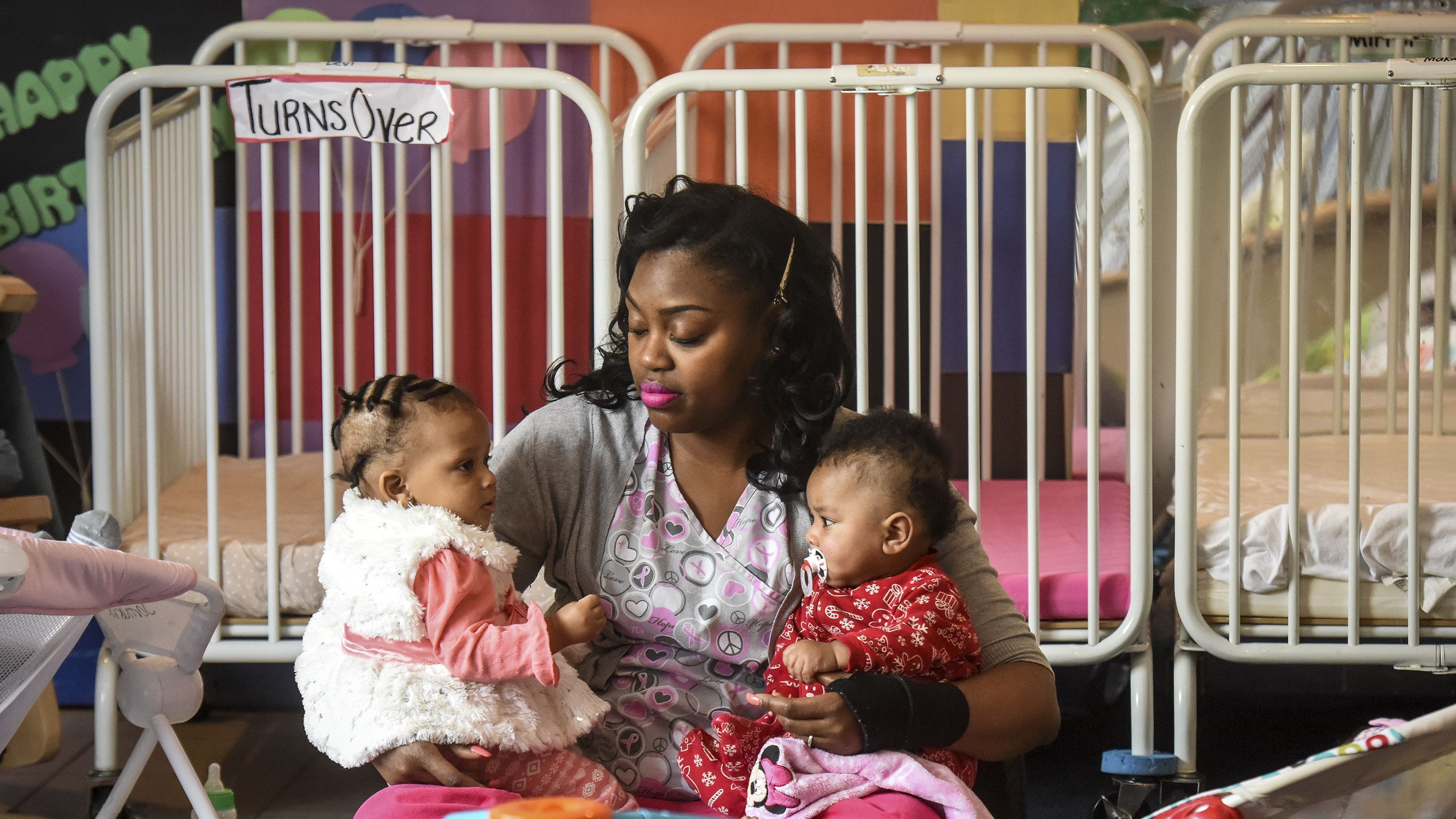
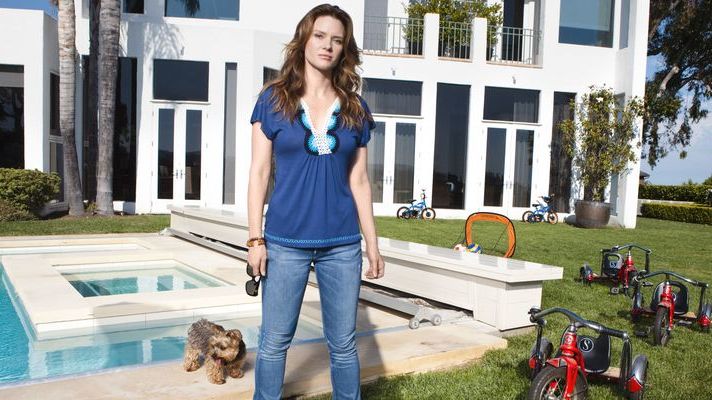
Sarah Treleaven is a writer and producer, and the host of USG Audio’s Madness of Two podcast. She lives in Nova Scotia.
